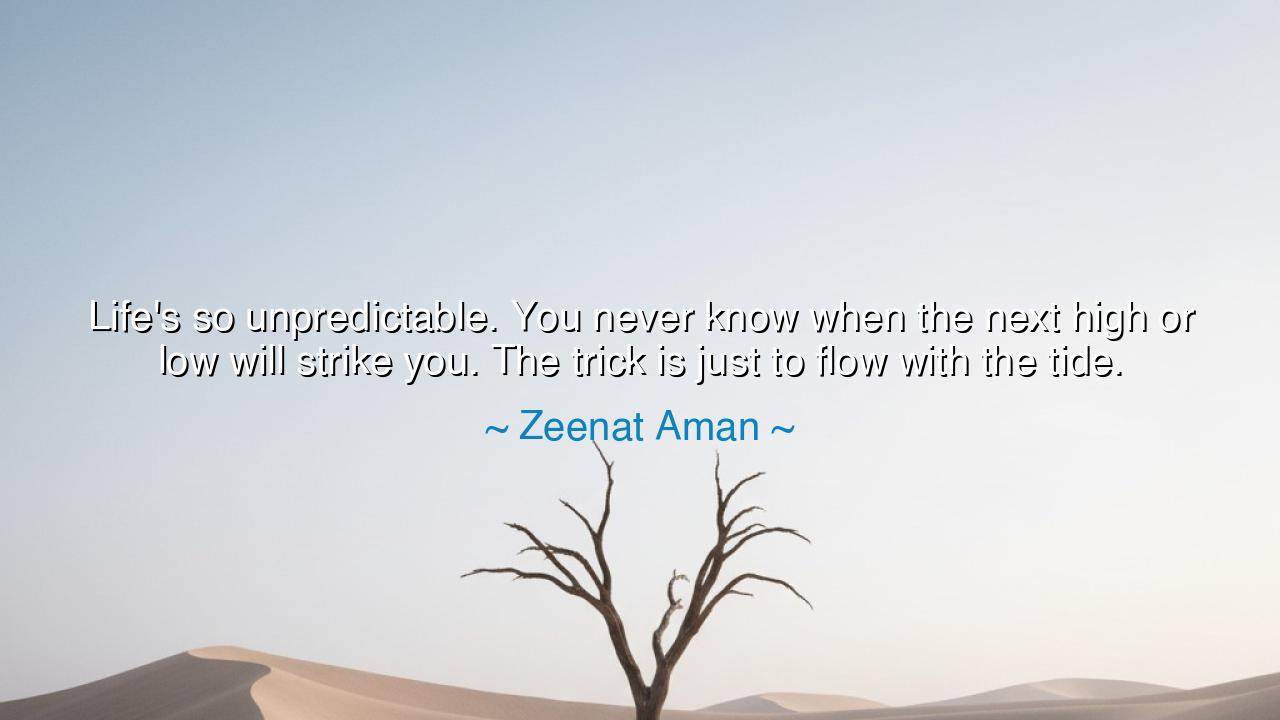
Life's so unpredictable. You never know when the next high or low
Life's so unpredictable. You never know when the next high or low will strike you. The trick is just to flow with the tide.






"Life's so unpredictable. You never know when the next high or low will strike you. The trick is just to flow with the tide." These words by Zeenat Aman convey a profound truth about the nature of existence—life is ever-changing, filled with ups and downs that we cannot always foresee or control. The essence of Aman's quote is the call to embrace uncertainty, and instead of resisting the flow of life, we should learn to move with it, accepting both the joys and the sorrows as part of the human experience. The metaphor of flowing with the tide speaks to the idea of acceptance, of being present in the moment, and of trusting that, like the ocean’s currents, life will take us where we need to go, even if we cannot see the final destination.
In the ancient world, this wisdom was echoed by many philosophers who pondered the inevitable uncertainties of life. Heraclitus, the Greek philosopher, famously said, "The only constant in life is change." Heraclitus understood that life is in constant motion, like a river that flows unpredictably. His teachings emphasized the need to embrace change and adapt to the flow of life, rather than struggle against it. To resist the natural course of the river, he suggested, was to invite suffering. Instead, one must learn to flow with the current, understanding that life’s twists and turns are an intrinsic part of its beauty and growth. Like Aman's advice, Heraclitus advocates for acceptance—for the wisdom to recognize that chaos is part of the order.
This theme of flowing with life’s unpredictability is also found in the teachings of the Buddha. In the Buddhist tradition, the concept of impermanence (anicca) teaches that everything—whether good or bad—is transient. Buddhism encourages followers to recognize the fluidity of life and not become attached to any single experience. The Buddha spoke of suffering (dukkha) not as something to be avoided, but as a natural part of existence. The path to enlightenment, he taught, is not to resist life’s inevitable changes, but to accept them with equanimity and mindfulness. In this light, Aman's advice to flow with the tide aligns with Buddhist philosophy, encouraging a life led by awareness and acceptance, rather than by fear or resistance.
Consider the life of Nelson Mandela, who, through decades of imprisonment, learned to embrace the unpredictability of life. Mandela’s journey was filled with the highest of triumphs and the lowest of tragedies, yet he flowed with the tide of his circumstances. Even in the darkest of times, when the struggle for freedom seemed impossible, Mandela found a way to remain grounded in his commitment to justice. His ability to adapt to the ever-changing political tides of South Africa, and to use his suffering as a source of strength rather than bitterness, allowed him to lead the nation through its transition to democracy. His life demonstrates the power of acceptance and resilience in the face of uncertainty—an embodiment of flowing with the tide.
In modern times, Steve Jobs offers another example of how unpredictability can be embraced. Jobs’ career, marked by failures and setbacks, reveals how embracing life’s unpredictability can lead to extraordinary success. After being ousted from Apple, the company he co-founded, Jobs didn’t resist or lament the turn of events. Instead, he sought new opportunities, founding NeXT and later Pixar, both of which paved the way for his eventual return to Apple. When he returned, he steered the company to unprecedented heights. Jobs famously said, "You can't connect the dots looking forward; you can only connect them looking backward." His life was a testament to the truth that while life may seem chaotic in the moment, every experience, even the hardships, can be a part of the larger flow that eventually leads to greatness.
The lesson in Aman's words is one of embracing life’s unpredictability. We cannot control when the next high or low will come, but we can control how we respond to it. Resisting the natural flow of life, as if trying to swim against the current, only brings exhaustion and suffering. Instead, we must cultivate the wisdom to accept that life’s rhythm will always be in motion—sometimes calm, sometimes turbulent—and that true strength comes from moving with it. By accepting the natural course of life, we open ourselves up to its inherent beauty and growth, no matter the circumstances.
In our own lives, let us remember Aman's advice: life is unpredictable. The key is not in fearing the unknown, but in accepting it with grace. Let us flow with the tide, trusting that the challenges we face will eventually lead us to greater wisdom and strength. Patience, resilience, and awareness are the tools we need to navigate the tides of life. Rather than struggling against the current, let us learn to adapt to the flow, knowing that each moment, whether high or low, contributes to our personal growth and peace. Like the river’s flow, life is not about avoiding the inevitable rapids, but learning to move with them, gracefully, purposefully, and with an open heart.






AAdministratorAdministrator
Welcome, honored guests. Please leave a comment, we will respond soon